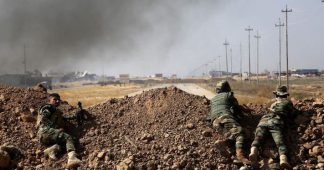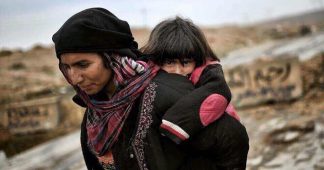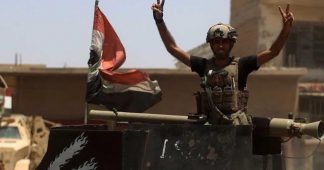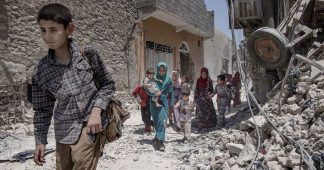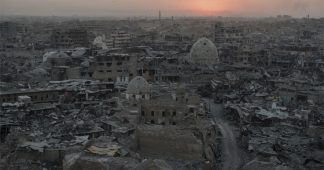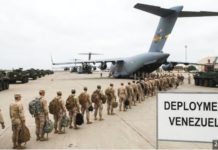Iraq’s Abuse of Civilians Will Make it Easy for the Next Version of the Extremist Group to Recruit
Published in The Huffington Post
By Belkis Wille
(Baghdad) – As the grim scene played out on my computer screen in Baghdad on July 12, my stomach sank.
I was watching a video clip of men in Iraqi army uniforms throwing a detainee off a cliff onto the banks of a river and opening fire on him. As he fell and landed next to another motionless body, I couldn’t help but think that this footage could breathe new life into the self-proclaimed Islamic State or ISIS or whatever ISIS 2.0 will be called now that its Iraqi “capital” has fallen. Such unchecked abuse, I thought, as Baghdad celebrated the liberation of Mosul on the streets below, would likely drive more enraged men into the hands of these extremists.
I first came across the clip, one of many depicting Iraqi forces committing abuses such as torture and execution, the day before on Facebook. It stood out because it featured a particularly disturbing form of execution and took place in a location that was far too familiar to me.
Within five minutes of its release, my colleague at Human Rights Watch who specializes in satellite imagery analysis, had identified the exact building and cliff in west Mosul where this video was filmed. What he saw in the images, which were spaced out over several days leading up to the date the video was circulated online, was Iraqi army vehicles present around the place from which the man in the footage had been thrown. This strongly suggests that the video is real and recent. The government has yet to properly comment.
If it is authentic, it wouldn’t be the first video of its kind to be released. Other videos of the Emergency Response Division of the Iraqi Ministry of Interior surfaced a few months ago and up until that point were perhaps the most disturbing abuse videos to come out of the battle to reclaim the fallen Iraqi city. But seeing this July 11 video emerge just after the prime minister declared victory over ISIS in Mosul, made me feel especially pessimistic about the future of Iraq and the potential defeat of ISIS. It was as if in the final phase of their campaign, Iraqi and United States-led coalition forces, who had launched the offensive months earlier, were saying, “Let’s get this over with as quickly as possible,” and disregarding respect for and commitment to the laws of war. Such a pervasive attitude will surely not go unnoticed and will likely backfire to embolden the future version of ISIS by drawing in more recruits.
In fact, despite celebrations in Iraq and media reports to the contrary, the recent defeat of ISIS in Mosul does not mean the end of ISIS. It means the end of an ISIS that controls territory. This is a blow to the so-called caliphate, but it’s also the beginning of a new phase, one that could be just as, if not more, frightening.
In the last few months as it’s lost ground in Mosul and its “capital” of Raqqa in Syria, ISIS has also been morphing quickly back into a traditional insurgent group, carrying out bombings in Iraq and Syria. A key part of why it will continue to attract recruits is exactly because of videos like the one I saw earlier this month. Such footage, which seemingly hypocritically showcases Iraqi soldiers using this battle to not only continue to abuse the civilian population, but also stoop to ISIS’ level when doing so, only further inflames the tensions ISIS thrives in.
While the first months of the Mosul offensive were relatively clean, this horrible video marked yet another instance of the government’s cruelty. Evidence of abuse by Iraqi troops from Mosul and from previous operations against ISIS in Iraq have, as I mentioned earlier, been seen before. Human Rights Watch has documented summary executions of suspected ISIS fighters, detention in inhumane conditions and collective punishment against family members of ISIS fighters, including home demolitions and forced deportations to “rehabilitation camps” at the hands of Iraq’s government. We have also documented the arbitrary detention of over 1,000 Sunnis displaced from the fighting around Mosul. But even this striking footage on the heels of Mosul’s liberation was an unfortunate wake-up call at a critical time for the country.
Worse, this video serves as a reminder of exploitation by the Iraqi government in years prior to ISIS. Since 2003, Iraqi forces and mostly Shia non-state and government armed groups have carried out abuses against the civilian population with complete impunity, mainly targeting Sunni Arabs. They have executed campaigns of arbitrary detention, enforced disappearance, torture, extrajudicial killings and forcible displacement. These experiences no doubt pushed young Sunni Arab men to join extremist groups in Iraq in the past. Families of those who have joined ISIS have told me this, and there’s no reason why the government’s ramped up abuse now will not continue to serve as a recruitment tool as ISIS seeks to reassert itself after its loss in Mosul.
Every Iraqi and coalition representative I’ve spoken with agrees that the battle against ISIS is not simply a military one, but also a political one to stem the push factors that most likely have encouraged young Sunni Arab men to turn to extremist groups. Part of this fight, perhaps more challenging than the military one, is to end the reign of impunity, and for Baghdad authorities to show the Iraqi public that they are investigating and holding their own forces and commanders accountable even while fighting back against ISIS.
But so far Human Rights Watch has not seen a single example of such accountability since 2014, including after grotesque videos of Iraqi officers from the Interior Ministry’s elite Emergency Response Division torturing and executing alleged ISIS affiliates and their family members were published in May. We heard from an adviser to Iraqi Prime Minister Haider al-Abadi on July 14 that the government would announce action against the officers involved, but not for some time, because it would “interfere with the current congratulatory victory messages.”
This suggests to me that Abadi does not fully appreciate how damaging these abuses continue to be. The battle for Mosul is meant to be the final battle in Iraq against ISIS, yet it has opened the floodgates to the very abuses that Baghdad has met with silence for years. Right now, Abadi should represent not only his constituency who desire a military blow to ISIS, but also the more than 1 million civilians who have lived under ISIS control for the past three years. He should demonstrate as quickly as possible that he also has their interests at heart, is taking steps to end the abuses that have marginalized them, and reintegrate them into an Iraq that aims to reconcile communities and rejects calls for retribution.
Abadi’s window is closing fast. Videos like the one on July 11 have eaten away at the feelings of optimism I had for where things are heading in Iraq ― not only in Mosul. It demonstrated that the country, even at the highest levels of government, is determined to sow more seeds of resentment rather than address grievances.
If Baghdad doesn’t act now, we will not only fail to see an end to extremist groups in Iraq anytime soon, but we will also see the cycle of marginalization continue and an ISIS 2.0 unleash itself on the world.
